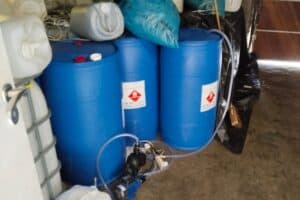The US-led coalition fighting the Islamic State group said on Sunday it was working to create a 30,000-strong border security force in northern Syria, drawing sharp condemnation from Turkey.
With the offensive against IS winding down, the coalition and its allies in the Syrian Democratic Forces alliance were beginning to shift their focus to border security, coalition spokesman Colonel Ryan Dillon told AFP.
“There is a goal of a final force of approximately 30,000,” about half of whom would be retrained SDF fighters, he said.
“There are approximately 230 individuals that are training right now in the border security force. That’s an inaugural class,” Dillon said.
Backed by the US-led coalition’s air strikes, special forces advisers, and weapons, the SDF has ousted IS from swathes of northeastern Syria.
Its Kurdish and Arab members now control territory bordering Turkey to the north, Iraq to the east and Syrian government forces to the west.
Turkey reacted sharply to news of the border force on Sunday, saying it would “legitimise a terror organisation”.
Ankara is fiercely opposed to the SDF, which is dominated by the Kurdish People’s Protection Units (YPG) — considered by the Turkish government to be a “terrorist” group.
“Rather than end its support to the PYD-YPG, these steps taken to legitimise a terror organisation and to make it permanent in the region are worrying,” said Ibrahim Kalin, spokesman for Turkish President Recep Tayyip Erdogan.
“Accepting this state of affairs is absolutely not possible,” Kalin added.
– ‘A new phase’ –
Top SDF media official Mustefa Bali confirmed the creation of the border force, and said training had already begun.
“We are transitioning to a new phase of coordination between us and the international coalition,” Bali told AFP.
“The wide areas and cities that were liberated need someone to protect them.”
Bali said the new units would be deployed along the Turkish border and adjacent to territory held by Syrian troops, but did not immediately respond to a question on rules of engagement in those areas.
Turkey has often targeted YPG positions in northern Syria and on Sunday, Erdogan threatened to attack the Kurdish-held area of Afrin in northern Syria “in the days ahead”.
The SDF’s relationship with regime forces is less tense.
Since last year, a “de-confliction line” cutting diagonally across eastern Syria has largely kept the two forces from clashing.
There was no immediate reaction from the Syrian government to the border force announcement.
The coalition declined to comment on possible military protocol when it came to Turkish or regime troops.
Dillon said the force was primarily part of a broader strategy to “prevent the resurgence of IS”.
“With the fight against IS, as the remaining pocket continues to go away, we know that doesn’t mean the end of Daesh,” he told AFP, using the Arabic acronym for IS.
“We’ll have to make sure that there is security that can be maintained,” he said.
Dillon said SDF troops in Syria’s east were already coordinating with Iraqi forces across the border to target any “transient movement” by IS fighters between the two countries.






